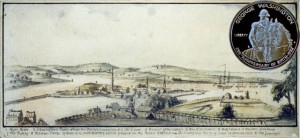Today, the Washington Commemorative Silver Half Dollar remembers the events of March 17, 1776.
From the Life of Washington, Volume I, by Jordan Sparks:
=====
Boston was evacuated on the 17th of March, and several regiments commanded by General Putnam immediately entered it, and took possession of all the posts. It was found to be very strongly fortified.
General Washington himself went into the town the next day, and was received with enthusiasm by the inhabitants.
The legislature of Massachusetts took an early opportunity to present to him an address, expressive of their respect and attachment, their obligations for the great services he had rendered to his country, and their thanks for the deference he had invariably shown to the civil authorities.
In reply he reciprocated their kind sentiments, congratulated them on the recent event, particularly as having been effected without the effusion of blood, but intimated, as to his own agency, that he had only done his duty, “wishing for no other reward, than that arising from a conscientious discharge of his important trust, and that his services might contribute to the establishment of freedom and peace, upon a permanent foundation, and merit the applause of his countrymen and every virtuous citizen.”
=====
In Volume 3, Mr. Sparks included the letter from George Washington to Nicholas Cooke, the governor of Rhode Island:
=====
Sir,
I have the pleasure to inform you, that this morning the Ministerial Troops evacuated the town of Boston, without destroying it, and that we are now in the full possession.
Upon this event I beg leave to congratulate you, and I sincerely wish, if the ministry persevere in the same unconstitutional and despotic measures, which too long have marked their conduct, that our opposition and resistance in every quarter, may be crowned with the success they have been here.
To what place is their destination, or what plans they have in view, is altogether unknown here. Most probably the next attempt will be against New York or some more southern colony.
However, I should think, though I do not believe they have any design against Rhode Island, that it will be advisable to keep a strict look-out; and I submit it to you, whether it may not be proper, against the time you apprehend they might arrive, to call in a number of the militia and have them posted in proper places.
I do not mean to direct the measure, but only to mention it for your consideration. To me it appears worthy of attention. I am Sir with great esteem Your Most Humble Servant.
=====
The Boston Gazette of that era described the evacuation:
=====
About nine o’clock, on the 17th instant, a body of the enemy were seen to march from Bunker’s Hill, and at the same time a very great number of boats, filled with troops, put off from Boston, and made for the shipping, which mostly lay below the Castle.
On the first discovery of these movements, the Continentals immediately paraded, several regiments embarked in boats, and proceeded down the river from Cambridge.
About the same time two men were sent to Bunker’s Hill to make discoveries.
They proceeded accordingly; and, when arrived, making a signal that the fort was evacuated, a detachment was immediately sent down from the army to take possession of it.
The troops in the river, who were commanded by General Putnam, landed at Sewall’s Point, where they received intelligence, that all the British troops had left Boston, on which a detachment was sent to take possession of the town, while the main body returned up the river.
About the same time General Ward, attended by about five hundred troops from Roxbury, under the command of Colonel Learned, who unbarred and opened the gates, entered the town in that quarter.
The command of the whole being then given to General Putnam, he proceeded to take possession of all the important posts.
=====
When they departed, the British left behind 250 cannon and 25,000 bushels of wheat.
The Washington Commemorative Silver Half Dollar shows against a view of a British fort and Boston harbor, circa 1775.
